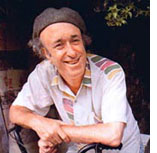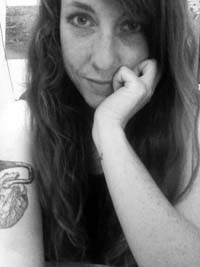Editor’s Note: The following column was written in response to a poem included in a previous San Diego Jewish World story written by Eileen Wingard: Here’s a link to the poem that caught my eye. https://www.sdjewishworld.com/2015/01/14/opening-slate-jewish-poets-share-works/
By Dan Bloom


CHIAYI CITY, Taiwan — Eleña Horvitz went to San Diego State University (SDSU) and graduated in 2013 with a degree in sociology. And she’s a poet with a distinct voice who counts Allen Ginsberg and Anne Sexton among her influences and inspirations, she told the San Diego Jewish World in a recent email exchange.
How did I meet the 23 year old woman? Well, to make a long story short, I was reading this online newspaper recently when I spotted an article that featured a poem that Horvitz wrote and read at a session of “Jewish Poets-Jewish Voices,” and in her words on the page I sensed a strong, distinctive voice emerging from a young poet and I wanted to know more about her.
So I emailed her and asked for a brief interview, and she was kind enough to reply.
Horvitz is not a full-time poet, of course, but writing is one of her passions. It might very well be part of her future.
After graduating from college, she was got involved with activist projects, she told me, such as working in such issues as racial injustice, police brutality, women’s rights, budget cuts on college campuses, and fighting to raise minimum wage.
“I found myself in the tough spot that so many college graduates currently do — having to find a food service job,” she said. “I got a job at a mom and pop sports bar and worked there for a few months
before a former sociology professor of mine recommended me for a teaching position in San Diego. I took the job and it has been an enlightening experience.”
Horvitz works for a program called World News Review where she focuses on small groups of students — elementary to high school age — teaching them how to read current events and why it matters, and about such things as critical thinking, empathy, and public speaking.
“The job has given me a sense of confidence as a teacher and a learner that I didn’t have before,” she said. “Last fall, I did a daily writing challenge with a friend because, since graduating from college, I found that I had been writing less and wanted to change that. Dedicating myself to the writing challenge
reawakened something inside of me that longs to reflect.”
Graduate school is in her future plans, Horvitz added, saying that she plans to pursue a master’s degree program in sociology or something closely related, such as anthropology or criminal justice.
“What I want to work towards in terms of a career is either teaching inside prisons or doing work to keep at-risk youth far away from the school to prison pipeline,” she said.
When asked where the focus on poetry came from, and her distinctive voice as a poet, Horvitz said that a writing teacher at SDSU, Jen Lagedrost, helped her find her voice. “Jen was one of the most passionate and free and grateful people I’ve ever met,” Horvitz explained. “She really wanted her students to understand the power of the word, and I consider her to be the matchmaker in the love of poetry I discovered within myself.”
In addition to Ginsberg and Sexton, the poetry of Gregory Corso and Pablo Neruda also resonate with her, she said.
The poem that caught my attention when I read it here at the San Diego Jewish World was titled “I Will Leave This World With an Aching Heart.” and I could feel its poetic power. Not many people, young or
old, can write with such intensity, so I wanted to know more about the poem and its author. The Internet connected us.
When asked where that poem came from, its theme and its language, Horvitz replied:
“As long as I have been trying to express my view of this life and reflect on the world from this perspective that I hold, I have really struggled with a fight between the head and the heart. Being a student has always been a priority and a given in my life. And I have always been a thinker. However, I’ve had to do a lot of learning when it comes to comprehending things in a way that may not allow me to see it as logical or explainable or measurable. I experienced a lot of death and loss at a young age, and this caused me to cave in on the emotional part of myself. In the years that passed, I put a lot of effort into coming to terms with everything I experienced because I knew that I didn’t want it to rule me for the rest of my life. Slowly but surely, I have been learning to feel and learning what it means to listen to the heart.
“The idea of balance — or seeking it out, rather — has been a big theme in my life lately,” she added. “I am always seeking it, striving towards it. To me, that poem represents my being able to find a delicate balance between thinking and feeling, the head and the heart, observing and participating.”
“When I began writing poetry, I knew I wanted to make a statement about injustice and how social circumstances affect the chances and opportunities we have and play a gigantic role in shaping who or what we have the potential to become,” Horvitz said. “However, the ability to express that idea the way that I did in this poem didn’t come to me until I discovered the part of myself that feels, the part of myself that is connected to being alive, the part of myself that is vulnerable and honest. It wasn’t until I explored that part of me that I was able to find the synthesis that came together in this piece. I wanted to reflect on every issue that grabs me. I wanted to convey how each one is connected to the next, and that struggle is struggle is struggle. Loss is loss is loss. Beauty is beauty is beauty. This poem allowed me to bring attention to the problems I see in the world by means of love.”
Horvitz has impressed many in the poetry community, and among them was Eileen Wingard, chair of the planning committee for the “Jewish Poets, Jewish Voices” events, who wrote the article in the San Diego Jewish World that I mentioned above.
“We were all deeply moved by Eleña’s poetry and pleased that her uncle, Michael Horvitz, a fine poet,
recommended her for our program,” Wingard told me by email.
Horvitz is the daughter of a Jewish father and a Greek Orthodox mother, and she told me that while she is not religious she did grow up with a menorah next to a Christmas tree in her San Diego home during the holiday season every December.
“I think my parents’ mutual acceptance of one another’s beliefs made me understand what it means to be a more accepting person,” Horvitz said.
An interesting fact: Horvitz was born on the last day of October in 1991, and that makes her a Halloween baby.
*
Bloom, based in Taiwan, is a freelance writer and inveterate web surfer. Your comment may be posted in the box below or sent directly to the author at dan.bloom@sdjewishworld.com